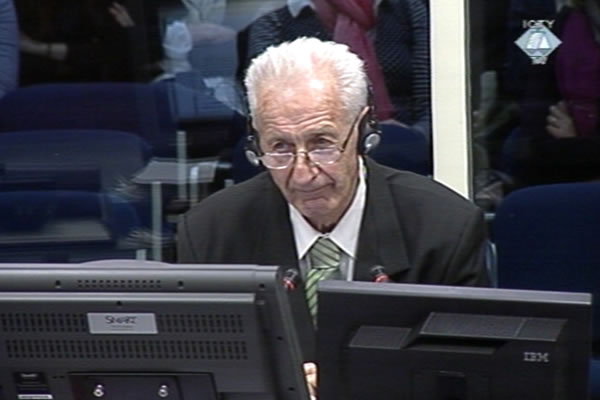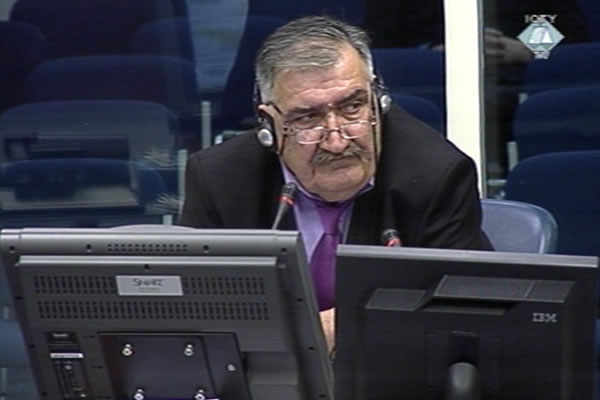Home
AIRBRUSHING SARAJEVO REALITY
Former director of the RS power company Elektroprivreda Milorad Skoko remained adamant that during the war Sarajevo had sufficient electricity for ‘basic household needs’. The wartime warden of the Kula prison described the conditions in that facility as entirely satisfying. The witness denied that civilians were detained there. Milorad Dodik will give evidence in Radovan Karadzic’s defense tomorrow
 Milorad Skoko, defence witness of Radovan Karadzic
Milorad Skoko, defence witness of Radovan Karadzic In his evidence in Radovan Karadzic’s defense, Milorad Skoko, who was the wartime director of the RS power company Elektroprivreda, calculated that each household in Sarajevo had 308 kWh of electricity daily. The amount was sufficient ‘for basic household needs’. In today’s cross-examination, prosecutor Sutherland put it to him that his arithmetic was not very sound: first, the electricity was used not only by households but by public institutions, and second, the witness underestimated the number of households in the city.
The prosecutor reminded the witness that the electricity that reached the city wasn’t used only for ‘household needs’. The power was first supplied to the hospitals, UNPROFOR and government facilities, humanitarian relief services, water pumps and other public users. What remained was to be distributed to the population, the prosecutor said. The witness replied that the distribution of power was an internal matter. As the prosecutor noted, an analysis made by the Institute for the Investigation of Crimes against Humanity in 1994 showed there were 85,000 households in Sarajevo; this report contradicts Skoko’s claims about 40,000 households. Skoko replied that he took the data from the 1991 census and divided the figure for the part of the city under siege by five or six, as that was in his view the ‘average number of household members in Muslim families’.
The prosecution brought up the UNPROFOR reports on constant power cuts in Sarajevo caused by the Bosnian Serb government and a BH Elektroprivreda power company report that in 1993 the city was without electricity for 140 days. At one point, according to the report, the power cut lasted for 53 days. Skoko didn’t believe the report of his colleagues from Sarajevo and claimed that the Serb side didn’t systematically obstruct the provision of vital supplies; there were some isolated cases when this was done by ‘groups of citizens’ acting of their own accord.
In the second part of the hearing, former warden of the Butmir Correctional and Penal Facility in Sarajevo, also known as the Kula prison, started his evidence. Skiljevic and Karadzic mostly tried to portray the facility in the best possible light. Thus the witness and the accused agreed that the detainees had three daily meals, were housed in cells with a wooden floor and sufficient number of ‘toilet and bathroom facilities’. The prosecution, on the other hand, claimed that it was a typical prison facility where non-Serb civilians were detained, beaten and killed.
Contradicting his previous claims that only prisoners of war and a number of ‘ordinary felons’ were detained in the Kula prison, in his interview with the OTP investigators in 2003 Skiljevic admitted that during the attacks on Croat and Muslim villages civilians were arrested ‘if they hadn’t managed to flee’. Now Skiljevic claimed they were brought to the prison ‘for the purpose of family unification’ and ‘voluntary’ transfer from other parts of BH to Sarajevo. Prosecutor Gustafson put it to him in the cross-examination that 10 members of the Zahiragic family from the Rogatica area has all been put in the Kula prison. Therefore, it was not logical that they would have to be ‘unified’ with anyone, the prosecutor said. The witness replied that he ‘didn’t study the topic’.
When the witness was asked why some documents state that the women detainees who were waiting for ‘the family unification’ had to do the same jobs as other detainees, his answer was even more original. Skiljevic said they were ‘bored’ and had asked to be allowed to work in the prison.
The cross-examination of Soniboj Skiljevic will continue after Republika Srpska president Milorad Dodik completes his evidence. Dodik should testify tomorrow morning.
Photos
Linked Reports
- Case : Karadzic
- 2013-04-05 ‘PSYCHOPATHS AND BULLIES’ COMMITTED CRIMES
- 2013-04-04 PERFECT HARMONY AT KARADZIC TRIAL
- 2013-04-04 ORIC WILL NOT ‘DEFEND’ KARADZIC
- 2013-04-09 DODIK BLAMES IZETBEGOVIC, HIGH REPRESENTATIVE AND OTP
- 2013-04-10 RELIGION DETERMINED MENU IN KULA PRISON RESTAURANT
- 2013-04-11 PRESIDENT OF ‘COMMITTEE FOR TRUTH’ ABOUT KARADZIC TESTIFIES IN HIS DEFENSE

